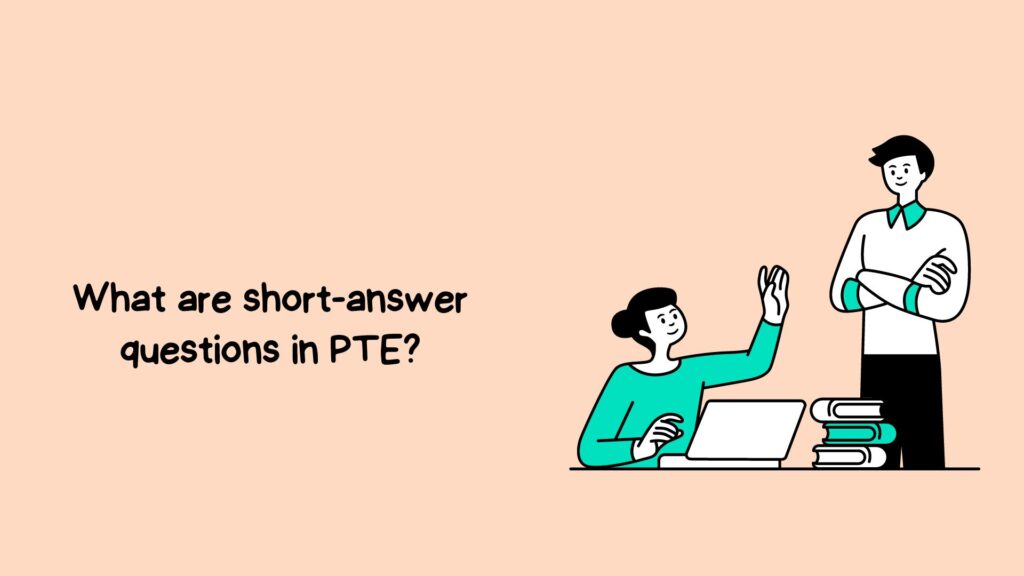Short Answer Questions are worth 9 marks within the Speaking Section of the Pearson Test of English PTE Academic. The question tests the spoken expression, vocabulary, and listening skills of the student. It also assesses the listening and speaking abilities to respond to a question with a concise answer.
In this article by our expert tutors, we shall provide you with the go-to guide for achieving 9 out of 9 in the Answer Short Question Task, providing all relevant details of the question along with secret tips and strategies for tackling the question.
PTE Success Online is the fastest-growing online PTE platform in Australia, with 10+ years of experience tutoring over 1000 students and a 98% success rate. Our 20+ instructors from around the globe are ready to help you achieve your dream PTE score. Our “Your PTE, Guaranteed” program has the highest success rate in the world.
How do I answer short questions in PTE?
Short questions related to general knowledge, everyday activities, or academic subjects are asked in the test. After listening to the question, the test-taker is required to provide a short, brief, and direct answer, usually one or two words or a short phrase.
The question tests the listening and speaking skills of the students to extract and convey information when asked. Nearly 9–12 short questions are asked in the task, which lasts about 5–6 minutes. The task is worth 9 marks.
How many marks does the short answer question carry?
The Short Answer Question, in its totality, carries 9 marks, according to the Pearson website. About 9–12 questions are asked of the test-taker, and therefore, each question carries approximately 1 mark in the test.
How long do I have to tackle the short-answer question?
The Answer: A Short Question Task lasts from 5-6 Minutes where you shall be asked 9-12 Questions. Therefore, you have 30 seconds to answer each of the questions.
How difficult is the short-answer question?
The Difficulty Short Answer Questions (SAQs) in the PTE Academic are considered to be higher than other questions. Although it varies depending on several factors, such as familiarity with the topic and listening comprehension skills, The familiarity of the topic for the test-taker and the concise speaking skills of the individual also impact the task. You must have great listening comprehension; otherwise, you will miss a keyword or misinterpret the question and give an incorrect response.
10 Secret Tips and Strategies for Short-Answer Questions
- Highlight the keyword
- Reverse Engineering
- Chunking Questions
- Shorten your speech.
- Timeboxing Practice
- Learn GK
- Progressive Difficulty Technique
- Paired Comparison Technique
- Mindfulness
- Sensory Anchoring
Highlight the keyword
Mentally highlight or underline keywords in the question as you listen. Develop your reply around the major keyword to formulate a quick and effective response.
Reverse Engineering
After developing your question and before responding, check what the question the question would be for the answer you have developed for relatively confusing questions. Make sure the question and the answer match.
Chunking Questions
If the questions asked seem complex or challenging, then break down the question into smaller, manageable chunks and focus on understanding each part separately.
Shorten your speech.
Short answer questions require precision, and to the word answer, generally, a phrase or several words at most. Therefore, learn to shorten your speech and response while practicing those questions.
Timeboxing Practice
Allocate a specific time limit for each SAQ practice session and gradually reduce it over time. The timeframe for answering one question is 30 seconds, so this technique simulates the time pressure of the actual examination.
Learn GK
The test-taker should also have fundamental knowledge of the basic questions of science, life, politics, routine, etc.
Progressive Difficulty Technique
Start with easier SAQs and gradually increase the difficulty level as you gain confidence. Prepare yourself for the variety of question types that can be potentially asked in the examination.
Paired Comparison Technique
Compare your responses with model answers or those of proficient speakers. Observe your failures, learn to refine your strategy, and find your hidden weaknesses.
Mindfulness
Be mindful about the exam and expose yourself to stressful situations during practice.
Sensory Anchoring
Associate specific sensory cues, such as tapping your fingers or taking a deep breath, to better answer the questions and remember the answers to the questions you might forget during the stressful hour of the examination.
What are the most commonly asked topics in short answer questions?
The most commonly asked topics in Answer Short Questions are as follows:
General Knowledge
It contains questions about everyday facts and concepts such as geography, basic science, history, and literature.
Daily Life and Routine
It consists of questions about everyday activities and phenomena, including routine, common actions, occupations, household items, and more.
Academic Subjects
Academic subjects are also asked in the Answer Short Questions with topics such as biology, physics, mathematics, etc.
The task also has questions surrounding gadgets, internet terms, medical professions, education, health, politics, etc.
Samples of Short Answer Questions (PTE)
Sample Set 1: General Knowledge and Everyday Life
- Geography: What is the capital of Japan?
o Answer: Tokyo - Basic Science: What gas do plants absorb from the atmosphere?
o Answer: carbon dioxide - History: Who was the first President of the United States?
o Answer: George Washington - Literature: Who wrote “Pride and Prejudice”?
o Answer: Jane Austen - Household Items: What do you use to sweep the floor?
o Answer: Broom - Occupations: Who cuts and styles hair?
o Answer: Hairdresser - Common Objects: What device is used to boil water quickly?
o Answer: Kettle - Food: What fruit is known for keeping doctors away if eaten daily?
o Answer: Apple - Sports: What sport is played at Wimbledon?
o Answer: Tennis - Mathematics: What is the result of multiplying 7 by 8?
o Answer: 56 - Technology: What device is commonly used to browse the internet on the go?
o Answer: Smartphone - Music: What instrument has black and white keys?
o Answer: Piano
Sample Set 2: Academic Subjects and Health - Biology: What is the powerhouse of the cell?
o Answer: Mitochondria - Physics: What is the speed of light in a vacuum (approximately)?
o Answer: 300,000 kilometers per second (or 186,282 miles per second). - Chemistry: What is the chemical symbol for gold?
o Answer: Au - Health: What vitamin is produced when the skin is exposed to sunlight?
o Answer: Vitamin D - Medical Professions: Who specializes in treating skin disorders?
o Answer: Dermatologist - Human Body: How many bones are there in the adult human body?
o Answer: 206 - Astronomy: What is the largest planet in our solar system?
o Answer: Jupiter - Environmental Science: What is the term for the gradual increase in the average temperature of the Earth’s atmosphere?
o Answer: Global warming - History: In which year did the Titanic sink?
o Answer: 1912 - Economics: What term describes a prolonged period of significant economic downturn?
o Answer: Depression - Psychology: What term describes a fear of heights?
o Answer: Acrophobia - Geography: Which river is the longest in the world?
o Answer: Nile
Sample Set 3: Technology, Culture, and Miscellaneous - Technology: What does “WWW” stand for in a website address?
o Answer: The World Wide Web - Computing: What does “CPU” stand for?
o Answer: Central Processing Unit - Culture: Which country is known as the Land of the Rising Sun?
o Answer: Japan - Art: Who painted the “Mona Lisa”?
o Answer: Leonardo da Vinci. - Film: Who directed the movie “Inception”?
o Answer: Christopher Nolan - Business: What is the term for a company’s visual identity, including its logo and color scheme?
o Answer: Branding - Transport: What is the name of the international airport in New York City?
o Answer: John F. Kennedy International Airport (JFK). - Literature: What is the title of the first Harry Potter book?
o Answer: Harry Potter and the Philosopher’s Stone (or Sorcerer’s Stone in the US). - Music: Who is known as the King of Pop?
o Answer: Michael Jackson - Cuisine: What is the main ingredient in traditional Japanese miso soup?
o Answer: Miso paste. - Space Exploration: Who was the first person to walk on the moon?
o Answer: Neil Armstrong - Fashion: What fashion item is Christian Dior famously associated with?
o Answer: The New Look
(Note: The question and answer are AI-generated to provide the test-taker with a fundamental knowledge of the questions asked.)

